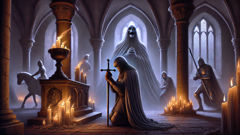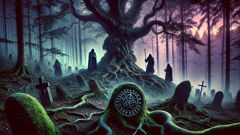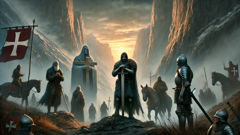Introduction
Mist clung to the winding slopes of the Harz Mountains as dawn struggled to pierce the brooding clouds. Far from the bustling towns and the laughter of the valley folk, an ancient castle stood atop a jagged crag, its silhouette stark against the pale, shivering sky. Here, time moved differently—hours seemed stretched by secrets and shadow, and the wild forests whispered of ancient pacts and restless spirits. Within the cold, stone halls of this fortress lived Sintram, a knight renowned for both his valor in battle and the darkness that trailed him like a tattered cloak. Long had Sintram's heart been troubled, weighed down by memories of bloodshed and loss. He was the only son of Sir Bertram, a lord whose pride was as fierce as the wolves that prowled the winter woods, and Lady Verena, whose gentle wisdom lingered in every echo of the castle's chambers. Yet the peace of his home was only a surface gloss; beneath it, storms raged. Sintram was haunted, not by the sins of others, but by visions that visited him with relentless persistence. In the trembling hour before dawn, when the world felt suspended between dream and waking, he would see the spectral figure of Death—tall, shrouded in gray—and a capering, sinister companion whose laughter chilled the blood. Sometimes they appeared as flickers in his periphery, sometimes as chillingly solid presences, conversing in riddles and urging him down ever darker paths. The villagers whispered that Sintram had been marked since birth, that a curse or a prophecy weighed upon his soul. Others pitied him, recalling how he strove to do good, to be honorable, but was forever at war with himself. On this particular morning, as rain threatened and the wind howled through arrow slits, Sintram stood at his window, gazing across the wild expanse. He knew a reckoning was coming—one that would not only test his steel but his very spirit. Yet he was not alone in his ordeal. Two steadfast companions would soon join him: a wandering pilgrim named Folko, wise in the ways of the world and the heart, and a loyal squire, Ewald, whose faith in his master never wavered. Together, they would embark on a journey fraught with temptation, courage, and the hope of redemption—a journey that would shape the fate not only of Sintram but of all who believed in the possibility of light breaking through the darkest night.
The Haunted Knight
Sintram's tale began with a legacy both glorious and grim. The son of noble lineage, he was raised on stories of honor and gallantry, of tournaments and crusades. Yet beneath the polished armor and stately banquets, shadows waited. As a boy, Sintram had always sensed the world differently—felt the pulse of old magic in the stones, heard whispers in empty corridors. It was said his birth coincided with the night of the Blood Moon, when wolves howled and strange omens were seen in the sky. His mother, Lady Verena, was the heart of the household: patient, wise, and endlessly gentle. But she could not shield Sintram from the tempests that gathered within. His father, Sir Bertram, expected a son of iron—unyielding and valiant. Sintram became a squire at twelve, riding out with seasoned knights, his sword hand swift but his mind always questioning.

Adulthood brought renown and sorrow in equal measure. Sintram's courage on the battlefield earned him the respect of friend and foe alike. Yet, every victory seemed tinged with bitterness. The faces of fallen enemies haunted his dreams, and sometimes in waking hours, he caught glimpses of figures who shouldn’t have been there. The visions grew sharper after his first campaign in the north. At night, the castle’s shadows lengthened and coalesced into shapes: a gaunt man swathed in gray—Death—and a twisted, sly figure with eyes like burning coals. The Devil, perhaps, though Sintram dared not speak the name aloud. These visitors offered taunts and bargains, their riddles echoing through Sintram’s mind.
One icy evening, as snow battered the windows and the wind howled like lost souls, Sintram sought solace in the castle chapel. He prayed for peace, for deliverance from these phantoms. As he knelt, a coldness crept over him—not just the winter chill, but the palpable presence of something other. The shadows deepened, and the Devil appeared before him, smiling with an unsettling familiarity.
“Brave knight,” the apparition hissed, “do you not hunger for greatness? For vengeance against those who slighted your name? Cast aside your doubts, and you shall know power beyond mortal ken.”
Sintram recoiled, his heart hammering. He remembered his mother’s words: “No darkness is ever so thick that a single light cannot pierce it.” Clutching the silver cross at his neck, he summoned what strength he could muster. “Be gone from me,” he whispered. The vision faded, but the chill lingered.
After that night, Sintram’s resolve hardened. He would confront the darkness, not flee it. Word spread that he rode through the wildest parts of the Harz, facing dangers both mortal and uncanny. His deeds became the stuff of rumor: slaying a wolf said to be the Devil’s hound, defending travelers from spectral riders at the crossroads. But always, the sense of being watched persisted. It was as though Death himself walked a few paces behind, waiting for a misstep.
The Journey of Temptation
In the spring, as the snows receded and the forests bloomed with wildflowers, a stranger arrived at Sintram’s gate. Folko of Montfaucon was a pilgrim from distant lands, weathered by travel but with eyes keen and kind. He brought news of the world beyond the mountains—tales of crusades, shifting kingdoms, and cities shimmering with faith and fear. Yet Folko seemed drawn to Sintram for reasons beyond mere hospitality. It was as if he sensed the turbulence within the knight, recognizing in him a kindred spirit.

Sintram welcomed Folko and introduced him to Ewald, his loyal squire. Ewald was young, earnest, and unwavering in his devotion. The three became companions, bound by an unspoken understanding of trial and redemption. One evening, as dusk painted the sky in bruised purples and gold, Folko spoke in quiet tones. “Sir Sintram, there are places where the world’s boundary is thin—where souls may confront what lies beyond. Will you trust me to guide you through such a place?”
Sintram hesitated but nodded. The next dawn, they set out from the castle, following ancient deer paths into the heart of the Harz. The forest was alive with the songs of hidden birds and the rustle of unseen creatures, but also an undercurrent of unease. Sometimes Sintram glimpsed fleeting shadows darting between the trees; sometimes, laughter echoed where no one walked.
At the heart of the wood stood an ancient oak—its trunk split and twisted, its roots clutching at broken stones carved with runes. Folko knelt beside it, murmuring a prayer. Suddenly, the air thickened. Sintram’s visions returned: Death stood beneath the boughs, his face obscured by a hood, while the Devil perched on a low branch, grinning.
“Knight of shadows,” Death intoned, “your journey is not only through these woods but through your own soul.”
The Devil’s laughter rang out. “Temptation lies ahead. Will you yield, or will you fight?”
Sintram felt the weight of every mistake, every angry word and reckless deed. He was tempted to bargain—to trade his pain for power or forgetfulness. But Folko placed a hand on his shoulder. “You are not alone,” he said softly.
The moment passed. The visions faded, but the challenge had been set. They pressed on, deeper into the wild, facing trials that tested not only their courage but their hearts. Ewald proved his loyalty when a pack of wolves encircled them beneath a blood-red moon, fending off the beasts while Sintram shielded Folko. Another night, they sheltered in a ruined chapel where ghostly voices recited forgotten prayers, their whispers tempting Sintram to despair.
Yet for every test, there was a reminder of hope. Folko’s wisdom illuminated the way, and Ewald’s steadfastness anchored Sintram when doubts threatened to overwhelm him. Still, he knew the true reckoning was yet to come—a confrontation with the darkness that dwelled within himself.
A Reckoning in the Shadowed Pass
The journey led Sintram and his companions to the foot of the Felsenklippe—a pass where the mountain’s bones jutted skyward like the ribs of some primordial beast. Here, ancient legends spoke of duels between mortals and spirits, of vows made and broken. The wind keened through the crags, carrying voices from centuries past.

At nightfall, they camped beneath an overhang, firelight dancing across rough stone. Folko recounted stories of penitent knights and wandering saints, of those who faced darkness only to find light in humility and forgiveness. Sintram listened, torn between hope and dread.
In the hush before midnight, as embers glowed red, Death appeared once more—not with menace but with solemn gravity. “The hour has come,” he said. “You must choose: surrender to despair or trust in redemption.”
Sintram’s soul ached with weariness. He saw visions of every man he had slain, every harsh word uttered in pride. The Devil materialized, tempting him with promises—glory without conscience, peace without repentance.
But Sintram remembered his mother’s voice and the unwavering presence of his friends. Ewald knelt beside him. “You’ve taught me courage, my lord,” he said. “I believe in your light.” Folko offered a simple wooden cross—a symbol of mercy and hope.
Sintram clutched the cross, feeling warmth bloom within. He faced the Devil and Death, his voice steady. “I will not bargain with shadows. My sins are mine to confess, and my path is toward the dawn.”
The Devil shrieked and vanished, torn away like mist at sunrise. Death’s form softened, his eyes kind. “Then your trial is nearly done. Remember: light is born where courage meets truth.”
As dawn painted the cliffs with gold, Sintram wept—not from fear, but from release. The mountains seemed less forbidding, the world wider and filled with possibility. The trio descended from the pass, changed and bound by an ordeal that would shape them forever.
Back at the castle, Sintram knelt before his parents. His father, once stern and distant, embraced him. Lady Verena’s eyes brimmed with tears of joy. Sintram spoke of his journey, of visions faced and burdens lifted. He pledged himself to mercy and justice, vowing never again to let darkness rule his heart.
In the years that followed, Sintram became a legend—not for feats of arms alone, but for wisdom, compassion, and the light he brought to those struggling in shadow. Folko returned to his wanderings, leaving behind lessons etched in memory. Ewald remained at Sintram’s side, ever loyal.
But even as peace settled over castle and valley, Sintram remembered the lesson won on the shadowed pass: redemption is not a gift granted once but a path walked every day, with each sunrise a promise renewed.
Conclusion
Legends say that Sintram’s story echoed for generations across the Harz Mountains. Travelers would speak in hushed tones of the haunted knight who conquered not just foes but the shadows within his soul. His journey through temptation and fear, guided by loyal companions and tested by spectral adversaries, became a beacon for all who battled with darkness—whether that darkness wore the face of an enemy or their own reflection. Sintram’s life proved that redemption is forged in struggle, and that even those marked by sorrow can become vessels of hope. His castle thrived under his just rule, and his people remembered him as a lord who never turned away from the troubled or the lost. Though the wind still whispers through the ancient forests and sometimes carries tales of Death and the Devil wandering at twilight, those who pass by Sintram’s old stronghold know that courage and compassion endure long after fear has fled. For every night haunted by shadows is answered by a dawn that brings healing, and every soul—no matter how burdened—can find their way into the light.













